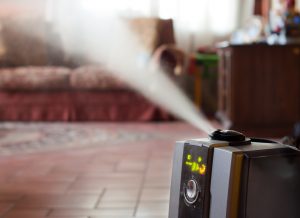 We live in one of the coldest parts of the country, and freezing temperatures are pretty much par for the course in February. We rightfully focus on keeping our homes warm with heaters and furnaces in the winter. But temperature is not the only factor that goes into household comfort. You also have to deal with humidity levels, which can get pretty low in the winter and cause all kinds of problems as a result. A whole-house humidifier might be the best solution to a problem that’s going to bedevil you whenever temperatures start to drop.
We live in one of the coldest parts of the country, and freezing temperatures are pretty much par for the course in February. We rightfully focus on keeping our homes warm with heaters and furnaces in the winter. But temperature is not the only factor that goes into household comfort. You also have to deal with humidity levels, which can get pretty low in the winter and cause all kinds of problems as a result. A whole-house humidifier might be the best solution to a problem that’s going to bedevil you whenever temperatures start to drop.
Why Is Low Humidity a Problem?
We measure humidity levels in terms of relative humidity: a percentage covering the amount of ambient moisture in the air. 100% humidity is basically rain, while 0% humidity means no moisture in the air at all (something that happens very infrequently on earth and then only in the dried deserts in the world).
Humidity levels tend to go down in the winter because of falling temperatures. As the mercury drops, the ambient moisture in the air coalesces into liquid or solid form, removing it from the air itself. (That’s why we get dew on the ground in the cool early morning in the spring and summer.) Human beings are most comfortable when the relative humidity levels sit somewhere between 30% and 50%. In the winter, that number often drops far lower, which causes all sorts of problems, including:
- Itchy Skin. Dry air can leech moisture off of our skin, resulting in a dry, itchy feeling. In the worst instances, this can lead to a rash.
- Increased Risk of a Cold. Dry air can cause the mucous membranes to dry out, which leaves our bodies more vulnerable to colds and illnesses.
- Static Electricity. Those painful shocks and unmanageable haircuts from static electricity increase dramatically when humidity levels go down.
- Higher Heating Bills. Dry air tends to feel cooler than humid air does. Heaters can compensate for that, but they must work harder to do their jobs in most cases, which raises both monthly bills and strain on the system. Forced-air furnaces and other heaters can dry the air out as they blow it through your home as well.
Humidifiers Solve the Problem
You may be familiar with small humidifiers, which help keep plants healthy when growing them inside, or perhaps to help a sick member of your household breathe more readily. A whole-house humidifier simply applies that concept to the entire home. In most cases, its installed at the apex of your ducts and works in conjunction with the heating system. It’s usually a fairly simple apparatus: a wick or pad attached to a reservoir, with a fan blowing across the top to release moisture into the air. The humidity levels can be tailored to suit your taste, and set the exact relative humidity levels you require.
If you could use a humidifier installed in your Lexington, MA home this winter, call the friendly pros at Cooling Unlimited, Inc. today to set up an appointment!

